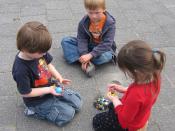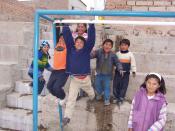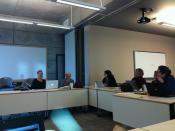When children enter school their contact with other children increases. The proportion of social activities that occurs in interaction with peers (as opposed to other contacts) continues to increase throughout childhood. By age 11, 50% of the individual's social activity occurs with peers (Hartup, 1983). By adolescence, time spent interacting with peers exceeds time spent interacting with the parent or any other socialization agent (Larson & Richards, 1991).
This essay will begin by defining the word peers, before going on to discuss what is so special about peer relationships and describe the difference between friends and non-friends, and then outline and evaluate the research relating to development in peer relationships.
By definition, peers are individuals who are close in age to one another, closely usually than siblings. Thus, in contrast with their status in most of their other relationships, especially those with adults, children are relatively equal in terms of power when they interact with their peers (Furman & Buhrmester, 1985).
The relationship between adults and children, and children and peers vary mainly because of the equality between children and peers. Piaget (1932/1965) suggested that because of this equality children are more open and spontaneous with their peers and express ideas and beliefs that they don't share with adults. Children often take adults beliefs and ideas as obedience whereas, children are more open to criticise and question their peers ideas and beliefs and more likely to ask for feedback when it comes to their own (Kruger & Tomasello, 1986). From such conversations children and their peers often construct their own rules and ideas and explanations when it comes to how and why things work.
Before discussing research related to the development in peer relationships, it is important that we understand the difference between friends and non-friends. From around the age...


